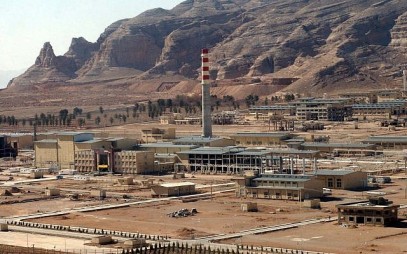Iran’s atomic energy agency is to make an announcement on Saturday about its next step away from the 2015 nuclear deal between Tehran and world powers, a move that President Hassan Rouhani has described as “highly significant.”
The semi-official Tasnim news agency and other Iranian media reported on Thursday that the agency will hold a press conference to reveal further details.
Rouhani on Wednesday reiterated Iran’s threat to take additional steps that go against the nuclear accord and accelerate nuclear activities if Europe fails to provide a solution, calling it Iran’s third, “most important step” away from the deal.
Rouhani indicated that after Friday’s deadline expires and Iran takes the next step, another two-month deadline to Europe will follow with the aim to resume talks with European leaders on reviving the deal.
The announcement meant Iran’s nuclear agency stood poised Thursday to begin work on advanced centrifuges that will enrich uranium faster as the 2015 nuclear deal unravels further and a last-minute French proposal offering a $15-billion line of credit to compensate Iran for not being able to sell its crude oil abroad because of US sanctions looked increasingly unlikely.

Iran has yet to say officially what exact steps it will take after the Friday deadline, but it is expected to focus on faster centrifuges, speeding enrichment and enabling Tehran to shorten the time it would need to have enough material available to build a nuclear weapon — if it chose to do so.
Under the unraveling deal, which has frayed after US President Donald Trump’s unilateral withdrawal of the US from the accord last year, experts thought Iran would need about a year to reach that point.
The US has continued its effort to choke off Iran’s crude oil sales abroad, a crucial source of government revenue. Iranian Foreign Minister Mohammad Javad Zarif, who continues a whirlwind global diplomatic tour, insists his country will do everything it can to keep those sales going, though he described US sanctions in an angry tweet Thursday as the equivalent of a “jail warden.”
“We will sell our oil, one way or the other,” Zarif told Russian broadcaster RT in a recently aired interview. “The United States will not be able to prevent that.”

Tensions between Iran and the US have been growing since Trump’s pullout from the nuclear deal, which saw Tehran agree to limit its uranium enrichment in exchange for the lifting of economic sanctions. Trump subsequently re-imposed old sanctions on Iran and created new ones, going as far as targeting Iranian officials like Zarif and Iran’s paramilitary Revolutionary Guard.
In his speech late Wednesday, Rouhani said Tehran would soon begin work on research and development of “all kinds” of centrifuges that enrich uranium by rapidly spinning uranium hexafluoride gas.

Iran has begun to break limits imposed by the 2015 deal, such as just creeping beyond its 3.67%-enrichment limit and its stockpile rules. Iranian officials already have raised the idea of enriching to 20% — a small technical step from weapons-grade levels of 90%.
Iran long has maintained its nuclear program is for peaceful purposes and denies it seeks an atomic bomb. However, Western nations have pointed to previous Iranian research into a weapons program that UN experts say largely ended in 2003 following the US invasion of neighboring Iraq, thought Israel, the US and other nations believe the program continues to be a key regime policy goal.
While Trump maintains he’s open for North Korea-style talks with Iran, his administration has continually upped its pressure on the Islamic Republic. On Wednesday, the US imposed new sanctions on an oil shipping network it alleged had ties to the Guard and offered up to $15 million for anyone with information that disrupts the Guard’s operations.
“There will be more sanctions coming,” Brian Hook, the US special envoy for Iran, told reporters at the State Department. “We can’t make it any more clear that we are committed to this campaign of maximum pressure.”
Hook also directly emailed or texted captains of Iranian oil tankers, trying to scare them into not delivering their cargo, according to the Financial Times.
Zarif reacted angrily to the report.
“Having failed at piracy, the US resorts to outright blackmail_deliver us Iran’s oil and receive several million dollars or be sanctioned yourself,” the diplomat wrote on Twitter.

Leave a comment